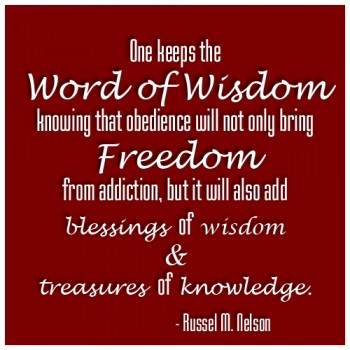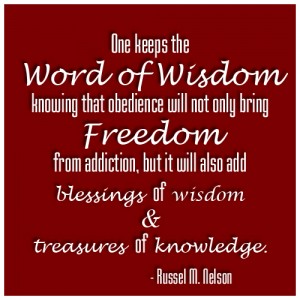Members of The Church of Jesus Christ of Latter-day Saints (the faith often inadvertently referred to as the Mormon Church) are known for many quirks, perhaps their abstinence from alcohol being the most telling. Ever since 1833, when its health law was received by revelation, Mormons have shied away from alcohol, as well as from coffee, tea, and tobacco. Mormon doctrine calls this health creed the Word of Wisdom, and its contents haven’t changed since the scripture was recorded over 150 years ago.
Recent studies have shown that Mormons may be on to something when it comes to alcohol. Turns out, Mormons may just be right about drinking, and governments around the world are starting to realize it.[1]
Alcohol Consumption is Increasing–Along with the Consequences
Some may argue that negative consequences from alcohol consumption affect primarily the individual drinking, and that no one–especially the government–has the right to interfere with personal choices. But the effects from dangerous alcohol consumption are affecting more than we may realize. Alcohol-related deaths have tripled since 1990 (as of 2014), and is the third leading cause of death and disability worldwide. Drinking-related violence has also seen an increase, and the world’s younger population is one of the demographics most likely to binge drink.
With the world’s youth drinking more and more excessively, the prognosis for their futures isn’t optimistic. Aside from the violence and crime that can result from alcohol use (like drunk driving), the world’s young population are doing significant damage to their bodies, effects that could plague them for a lifetime.
Governments Try to Step In
Governments around the world are trying to step in and manage alcohol consumption by taxing the product and creating “ceiling floors” (imposing a minimum price on alcohol), though these efforts can’t reach the root of the problem. Higher taxes on alcohol may make drinking more expensive, but within those demographics most likely to be susceptible to addiction are those who can’t technically afford the tax but who will shell it out anyway. And ceiling floors will likely harm the manufacturing companies more than they will persuade the public to go easy on the drink.
What Mormons have in this matter is something that taxation and legislation can’t address: doctrine. And when people can internalize the reasons behind a directive and make it a part of their inner principles and belief systems, then personal–and global change–can happen.
The Doctrine of No Alcohol
The Mormons’ Word of Wisdom is a piece of revelation from God given to Joseph Smith, the modern-day prophet who restored the full gospel of Jesus Christ to the earth after centuries of worldwide doctrinal drift. It can be found in the Mormon scriptural canon in the Doctrine and Covenants (section 89). The exact wording is this:
To be sent greeting; not by commandment or constraint, but by revelation and the word of wisdom, showing forth the order and will of God in the temporal salvation of all saints in the last days–
Given for a principle with promise, adapted to the capacity of the weak and the weakest of all saints, who are or can be called saints. . . .
I have warned you, and forewarn you, by giving unto you this word of wisdom by revelation–
That inasmuch as any man drinketh wine or strong drink among you, behold it is not good, neither meet in the sight of your Father. (verses 2-5)
The scripture goes on to prohibit strong drinks (including other varieties of alcohol beyond wine), tobacco, and hot drinks (such as coffee and tea). The Word of Wisdom also encourages healthy eating, such as consuming grains, vegetables, fruits, and meat sparingly. The doctrine encourages us to eat according to the season and makes promises to those who adhere to this code.
The Word of Wisdom supports other doctrine in The Church of Jesus Christ. The Church teaches that our bodies are gifts from God, that we are created in His image, and that after we die we will eventually be resurrected with our spirits eternally reunited with our perfected physical bodies. Because of the eternal nature of our bodies, we have a responsibility to care for them properly throughout our mortality.
The Word of Wisdom is also doctrine that speaks to the power of obedience. Perhaps some Mormons (called “saints” in the actual scripture) could safely drink alcohol and not let it consume them. But the Word of Wisdom was issued for all saints, even the weakest one. And so the Word of Wisdom becomes as much a doctrine about health as it does about obedience to the word of God. The promise of the Word of Wisdom is marvelous:
And all saints who remember to keep and do these sayings, walking in obedience to the commandments, shall receive health in their navel and marrow to their bones;
And shall find wisdom and great treasures of knowledge, even hidden treasures;
And shall run and not be weary, and shall walk and not faint.
And I, the Lord, give unto them a promise, that the destroying angel shall pass by them, as the children of Israel, and not slay them. Amen. (verses 18-21)
Seeing Worldwide Change
Legislation will be able to do only so much in addressing the problem of alcohol consumption. Even in the 1920s and 1930s when alcohol was illegal in the United States, black market drink was prevalent and the black market strong. Government intervention can reach only so far. Real and lasting change can come only through understanding eternal doctrine and living it. Mormons understand the reasons behind the edict against alcohol, and they currently stand as an example of a worldwide group of people who can successfully abstain from drink and other harmful substances.
If you want to know more about Mormons, the Word of Wisdom, and what Mormons believe, go here.


